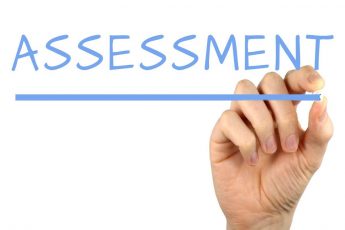My 8 Pillars of Assessment–for now…

I am instructional coach and challenging thoughts about practice because “that’s what we’ve always done” is part of my job. I start with my own. I’m a product of 16 years of traditional US education and, let me tell you, I was GREAT at it. I loved grades. They were part of my identity: hard working, law abiding, bright girl. How many of my views about grading came simply from my experience?
Assessment is a hot topic at school. People are asking good questions, but change is scary–and we don’t want to change things for the worse! It’s time for a thoughtful look at assessment. To that end, I spent the summer taking an online course on assessment. My last assignment was to develop my personal philosophy of assessment.
- Grades should measure student performance towards achieving the standards and not behaviors. To that end, standards must be made clear to students and should be an integral part of the instructional process. Students learn best what they are expected to learn is clear and they can assess their own progress towards the goal. That being said, grades should be assigned at the end of learning, that is, for summative assessments, alone. In addition, since behaviors have nothing to do with the standards, including them in the grade would taint the accuracy of the measure. Such behaviors include, but are not limited to, late work, absenteeism, and cheating. Those behaviors deserve a behavioral consequence.
- Students should be given ample opportunities to demonstrate their learning. The shop for learning should remain open as long as is feasibly possible for the teacher and student. That is, I believe in retakes at any time. I believe students must earn the right to retake by showing they have done sufficient work to be able to demonstrate mastery for the standard that they were unable to perform previously. I believe in using a four point scale over 100 since there is greater inter-rater reliability.
- Frequent, clear and positive feedback and student reflection are essential to learning. Formative assessment should be ungraded, provide feedback that a student can act upon, and positive in nature. It is our instinct to find errors and correct them, and that is important. However, feedback, particularly in standards that are demonstrated best by writing or presentation, can actually be more powerful when a teacher highlights the strengths of the student’s performance and then make suggestions towards improvement. Formative feedback may be simply a conversation between teacher and student (conferencing) or can be written feedback on a formative assessment. Providing time and a structure for student reflection towards his/her own progress towards the standard is a powerful tool for the future, teaching students how to monitor their own learning throughout their lives.
- When it comes to standards, less is more. US math text books contain 175% of the number of German standards and 350% of what Japanese texts cover. Both countries outperform the US in math (Schmoker). That being said, we should carefully select which standards are essential for student learning and report on those standards alone. If time is prioritized to treat each standard with due diligence, students will be able to access the standard at a level of greater understanding and rigor.
- Standards should be assessed at an appropriate level of Depth of Knowledge. If the standard is “to make inferences,” for example, simply identifying a correct inference from a select response item is not asking students to perform the standard as intended. Rather, asking students to read a passage and then, make an inference providing evidence for their reasoning from the text, is better suited to the standard.
- Assessment is best when it is authentic. For example, asking students to compare and contrast two different systems of government is best done in either a presentation or written form, not a standardized multiple choice test. When assessing speaking and listening skills, students should be assessed performing those skills in a manner they might be expected to in the future—before a real audience outside the classroom would be even more powerful and would motivate students. Standards should be assessed more than once and by a variety of means. In fact, a standard assessed by three different means is ideal and is referred to as a “triangulation of data.” In addition to written exams, portfolios, blogs, videos, essays, presentations, projects are all viable methods of assessment.
- Growth mindset goes hand in hand with standards based assessment. Students must know that all formative work is to prepare them to master the target. The focus should be on learning and not on “point getting.” Initially failing to meet a standard while learning, is expected and normal. In addition, allowing students to retake assessments in order to improve their performance provides hope and motivation for them to continue to learn.
- Differentiation is important for student learning. That being said, students who are working toward standards that are above or below his/her grade level standard is appropriate, but should be denoted when reporting out to universities. High school level students who are working towards grade school standards should be measured against those standards alone. However, it should be noted that they are working at grade 6 standards, for example, on their report card. Likewise, students taking courses that require students to master more difficult or additional standards should be rewarded as well. This has traditionally happened through a GPA bump. **Note: I’m not sure how grades for special needs students are reported at my school. This are my thoughts alone.
This is my CURRENT philosophy on assessment. It is organic and a work in progress. I’d love to hear from you–feedback? Questions? Thoughts?
Bibliography
Schmoker, M. J. (2011). Focus: elevating the essentials to radically improve student learning. Alexandria, VA: ASCD.